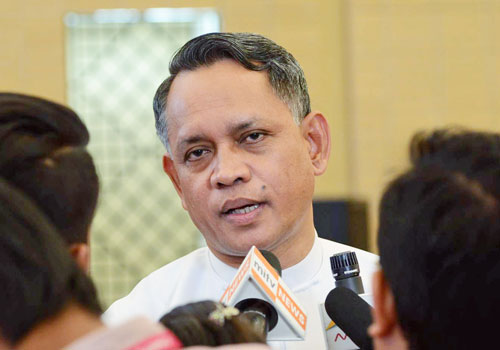No slowdown in foreign investment in Myanmar : Secretary General of Myanmar Investment Commission
10 Nov 2015
Yet the anticipated slowdown in investment has not materialised. Instead, over the past few months his Yankin office has been filled with “guests” seeking investment advice or approval.
The figures go some way to proving it. The MIC has approved 127 projects this year, 10 more than in the same period last year.
Total pledged FDI to end-October has dropped slightly to $3.7 billion from $4.1 billion, though 55 more projects are awaiting approval.
“It’s not a slowdown,” he said. “I’m quite sure we will meet the target.”
He sees FDI gathering pace throughout next year and brushed off the suggestion of an investment hiatus in the next few months as the new government is formed.
“There will definitely be much more [FDI] after the election, if everything goes well,” he said. On whether everything will go well, he is optimistic – “particularly for business”.
The MIC will continue in its current state and will hold at least two meetings a month, until the end of March when the incoming president and Union government will select new members, including a Union minister as chair.
The new MIC will not be short of work. Its first task will be to pass the new Myanmar Investment Law and a revision of the Myanmar Companies Act. U AungNaingOo had hoped to pass both before the end of this year, but is now looking at 2016.
“It will be next year,” he said. “We intended to approve the law in the upcoming session but it has taken some time to incorporate suggestions.”
He believes the law is the first of its kind in Myanmar, in that it has taken into account the views of a wide number of stakeholders. It is “much better” than the existing Foreign Investment Law, he said.
The MIC will also work on a “business for peace initiative”.
“We will help groups that have signed the nationwide ceasefire agreement[NCA] by promoting business in their respective regions and states,” he said.
Development is difficult without peace, he added, giving as an example the much delayed East-West Economic Corridor, an Asian Development Bank-backed project designed to connect Myanmar with Thailand, Laos and Vietnam.
If it goes ahead, the corridor will run through Kayin State. The Karen National Union (KNU) was the largest of seven armed ethnic groups to sign the NCA in October.
Other Kayin groups condemned the KNU for its decision – the “nationwide” agreement was widely seen as a failure, with many armed ethnic groups excluded by the government or choosing not to sign.
For the groups that have not signed, “The creation of stability is more important than the promotion of business,” said U AungNaingOo.
In resource-rich areas such as Kachin, many business activities are outside the purview of the MIC. “There is business there, but almost none of it is approved by the MIC.
Most of the jade mining projects, for example, are under the Ministry of Mines,” he said.
Asked whether he planned to formalise such investments, particularly those of foreign mining companies, he said, “Yes, we should do that. But there is no foreign investment in mining at all.”
International investors may do business under Myanmar identities, he conceded, though said this was not MIC’s problem to solve.
Country-wide, the investment commission will promote three “priority” sectors – manufacturing, infrastructure and agriculture.
Under the military government between 1988 and 2011, resource-based investment dominated. Hydropower accounted for 40 percent of total FDI. Oil and gas came a close second with 38pc, followed by the mining sector with 8pc.
This has changed under the current administration, said U AungNaingOo.
Between April 2011 and October 2015, oil and gas has comprised 27pc of FDI, followed by electric power with 22pc, manufacturing with 20pc, telecoms with 14pc, real estate with 7pc, and hotels and tourism with 6pc.
“You can see a clear diversification away from resource-based businesses,” said U AungNaingOo. “More importantly, manufacturing has taken on an important role, creating employment and helping exports”.
The glaring disappointment is agriculture, which brings in less than 1pc of foreign investment. The sector “does not create profit in the blink of an eye”, said U AungNaingOo, and Myanmar’s land policies do not offer much security to foreign investors.
“Unfortunately agriculture is one of our promotion sectors, and we have not been successful,” he said.
Responsible investment is high on his list of priorities.
“The projects that have created problems such as [Letpadaung] copper mine or Myitsone Dam were not approved by the MIC of this government,” he said.
“Our MIC seriously considers the quality of investments – their impact on society and the environment, whether they will create jobs and promote exports.”
For U AungNaingOo, the future is bright. Negotiations for large-scale bilateral investments with a number of partners including the European Union are under way, which he hopes will give more confidence to investors.
He projects annual FDI at around $6 billion per year until 2020, rising to $8 billion per year until 2025 and $11 billion for the next five years until 2030.
“I am really, really optimistic about the future of Myanmar,” he said.Reference: http://www.mmtimes.com/index.php/business/17427-no-slowdown-in-foreign-investment-says-mic-secretary.html











